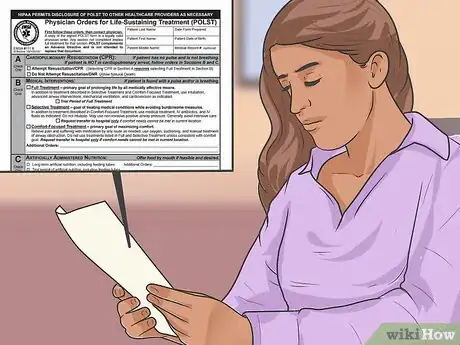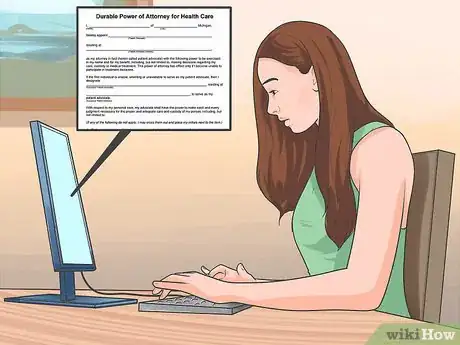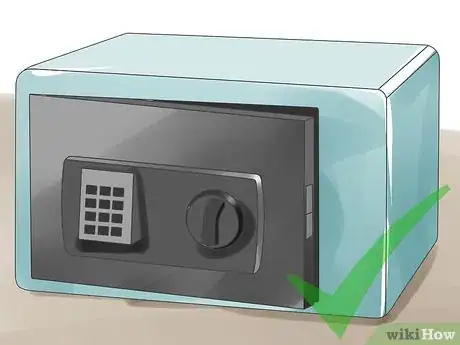This article was co-authored by Clinton M. Sandvick, JD, PhD. Clinton M. Sandvick worked as a civil litigator in California for over 7 years. He received his JD from the University of Wisconsin-Madison in 1998 and his PhD in American History from the University of Oregon in 2013.
This article has been viewed 30,859 times.
This article is written for persons living in the United States. Powers of Attorney in other jurisdictions do different things and have different rules and requirements. Please make sure you are consulting the laws of your own jurisdiction if you are not living in the United States.
In the United States, a medical power of attorney is a legal document that appoints someone else to make decisions about your health and medical care when you become unable to do so due to your medical condition. Having a trustworthy family member or friend designated as a medical power of attorney will give you some control over what happens to you. If your health deteriorates to the point that you can no longer communicate with your doctors and other healthcare providers, you can have someone express your wishes about continuing medical care to your doctors and other healthcare providers. Write a medical power of attorney while you are still in good health so that you can make important medical decisions ahead of time and have assurances that your wishes will be carried out.
Steps
Choosing a Medical Power of Attorney
-
1Talk with close family members and friends about your wishes. Your medical power of attorney should be someone who you trust, and someone who understands your religious and moral beliefs. This person should promise to carry out your wishes and make decisions that you would make yourself if you were able to do so.[1]
- Healthcare providers such as your doctor and their staff members cannot be named as medical power of attorneys for legal and ethical reasons.
- A medical power of attorney is different than a power of attorney who has the authority to make financial decisions on your behalf. That type of power of attorney is designated in a different type of legal document.
- A medical power of attorney also may be called a medical agent.
- A medical power of attorney may be contained within a living will, which is a legal document in which you make certain decisions about whether you wish to receive life-sustaining nutrition or be kept alive by other artificial means.
-
2Decide whom you can trust to make medical decisions for you. There are a number of different factors to consider in making this choice. Most importantly, you will want to choose someone whom you believe would carry out your wishes, even if he or she does not share your beliefs or would not necessarily make the same decision. You also may consider the following factors:[2]
- Location – Your designated medical agent should live near to you so he or she can be available in the event of an emergency.
- Age – Choosing someone who is likely to outlive you is important. If you choose a person who is much older than you, you run the risk of that person dying before your power of attorney ever needs to come into effect. If you have not revised your power of attorney after your agent’s death, then you may have no valid power of attorney in place when an emergency occurs.
- Health – Choosing someone who is in good health is important for the same reasons as the age of the person whom you choose.
- Religious and lifestyle choices – You should choose someone who either agrees with your religious beliefs and lifestyle choices or is willing to set his or her own beliefs aside in carrying out your wishes.
Advertisement -
3Ask the person you have chosen if he or she is agreeable to becoming your medical power of attorney. Do not assume that someone will agree to be your medical power of attorney. Discuss your request at length with the person and do not execute a medical power of attorney unless he or she is completely comfortable with both the designation of medical agent and your wishes should you become incapacitated.[3]
Researching Your State’s Requirements for a Medical Power of Attorney
-
1Check state law to see if a specific form or other documentation is required. Some states have a standardized form to be filled out for a medical power of attorney to take effect. These forms can often be downloaded online for free, or can be obtained from certain government offices Other states will require you to draft your own medical power of attorney that meets with all legal requirements of the particular state.[4]
-
2Determine which type of medical power of attorney you wish to sign. Some states distinguish between a durable medical power of attorney and a springing durable medical power of attorney. While a durable medical power of attorney goes into effect right away, a springing medical power of attorney does not go into effect until you become incapacitated to the point that you can no longer make your own decisions.
- Both types of medical powers of attorney are called “durable,” because otherwise they would be voided when you became incapacitated. Durable means that they remain in effect even though you are incapacitated.
-
3Consider whether you qualify for a Physician Order for Life-Sustaining Treatment (POLST). About 12 states offer this program as an option. The idea behind a POLST program is to ensure that you receive consistent healthcare according to your wishes if you are incapacitated and are transferred from one healthcare facility to the next. This program is helpful when a new healthcare provider may not have immediate access to your living will or power of attorney.[5]
Drafting Your Medical Power of Attorney
-
1Download or obtain a copy of any form required by your state. Some states have standardized forms for use as medical powers of attorney statewide. Other states do not have standardized forms for use. If there is a standardized form, make sure that you completely fill it out.[6]
-
2Clearly identify the principal, or the party who is granting the medical power of attorney, the agent, or the person who being designated as medical power of attorney, and describe the powers that the medical power of attorney has or will have in the future.
-
3Name a secondary or subsequent medical power of attorney in case the original agent is unable to serve. Write down any specific instructions for your health or end of life care.
-
4Decide what powers to include in your medical power of attorney. You can state very specific directions in your medical power of attorney, or just generally give your medical agent the right to make any and all decisions about your health.[7]
- For Instance, you can state in the medical power of attorney whether you want aggressive and invasive treatment in the event that you develop a long, chronic illness.
- You also can include clear instructions about whether you want to be resuscitated if your illness or condition causes you to stop breathing.
- Be sure to note any medical treatments that you object to, for religious or other reasons.
- Be aware that a medical power of attorney cannot transfer a power from principal to agent that is illegal to transfer. For instance, you cannot give your agent the power to draft and sign a will on your behalf. Any such will would be void and unenforceable.
-
5Consider seeking professional legal help in preparing documents such as a medical power of attorney. Paying a lawyer is not always necessary, as there are legal aid and other programs nationwide that may provide this service at little or no cost. If you have an unusual or complicated situation, you should consult an attorney for advice.
-
6Sign your medical power of attorney. Each state has specific requirements about the signing of a medical power of attorney and what it takes to make it valid. If you don’t follow these requirements, your medical power of attorney may be void and completely ineffective.
- Some states require that you sign your medical power of attorney before a notary public, who then signs the power of attorney, as well. You can find a notary public at most local bank branches. Notary public services may be free if you have an account at that bank, or available for a small fee if you do not have an account at that bank.
- Some states require that one or more witnesses be present when you sign a medical power of attorney.
Making Others Aware of Your Medical Power of Attorney
-
1Keep the original medical power of attorney in a safe place, such as with an attorney, family members, or inside of a safe or deposit box. Make sure the medical power of attorney knows how to access it when it is needed, or give him or her a copy.
-
2Give a copy of the medical power of attorney to your doctor. You should give a copy of your medical power of attorney to your primary care physician, as well as to any other doctors or healthcare providers who treat you on a regular basis.
-
3Make others aware of whom you have chosen to be your medical power of attorney. Inform your close relatives and family members, as well as your close friends, of whom you have chosen as your medical agent. By doing so, you ensure that there are no surprises if you become incapacitated and your medical power of attorney needs to make decisions for you.
Warnings
- Remember that different states have different requirements for a medical power of attorney to be valid. Forms that you may find online may not always follow the requirements of your state’s laws, and therefore may be invalid.⧼thumbs_response⧽
References
- ↑ http://estate.findlaw.com/living-will/the-definition-of-power-of-attorney-living-will-and-advance.html
- ↑ http://estate.findlaw.com/living-will/healthcare-power-of-attorney.html
- ↑ http://www.webmd.com/palliative-care/advance-directives-medical-power-attorney?page=2
- ↑ http://www.webmd.com/palliative-care/advance-directives-medical-power-attorney?page=2
- ↑ http://www.polst.org/
- ↑ http://estate.findlaw.com/living-will/healthcare-power-of-attorney.html
- ↑ http://estate.findlaw.com/living-will/power-of-attorney-for-healthcare-and-living-wills.html





































































